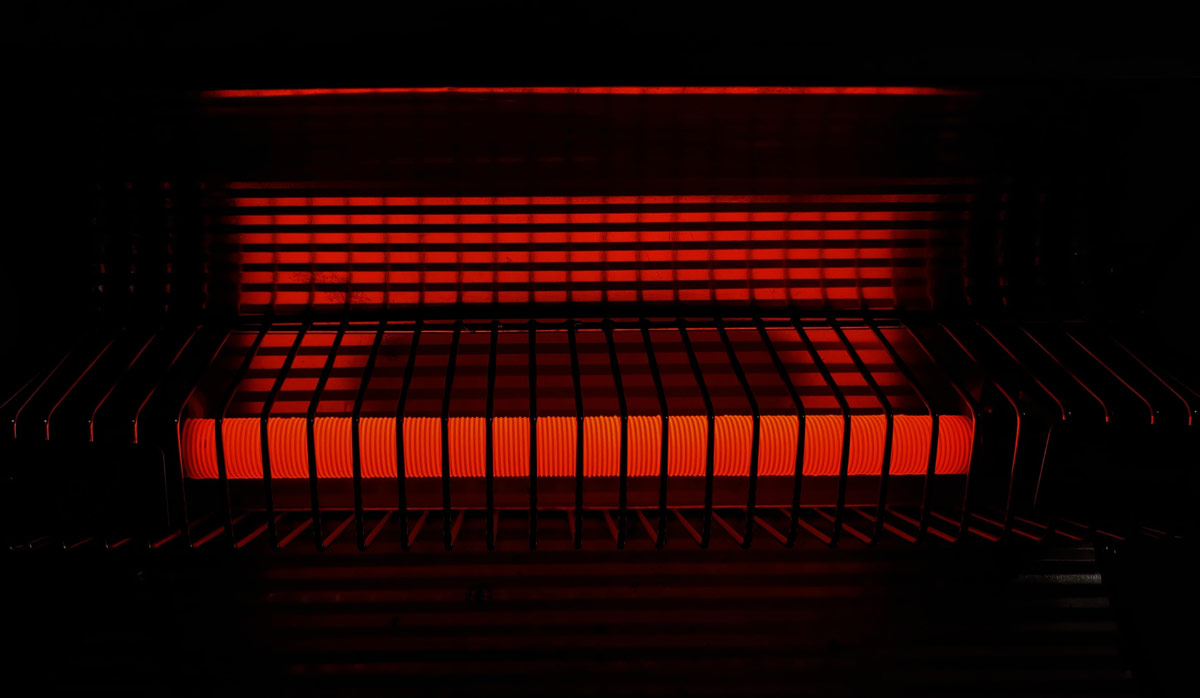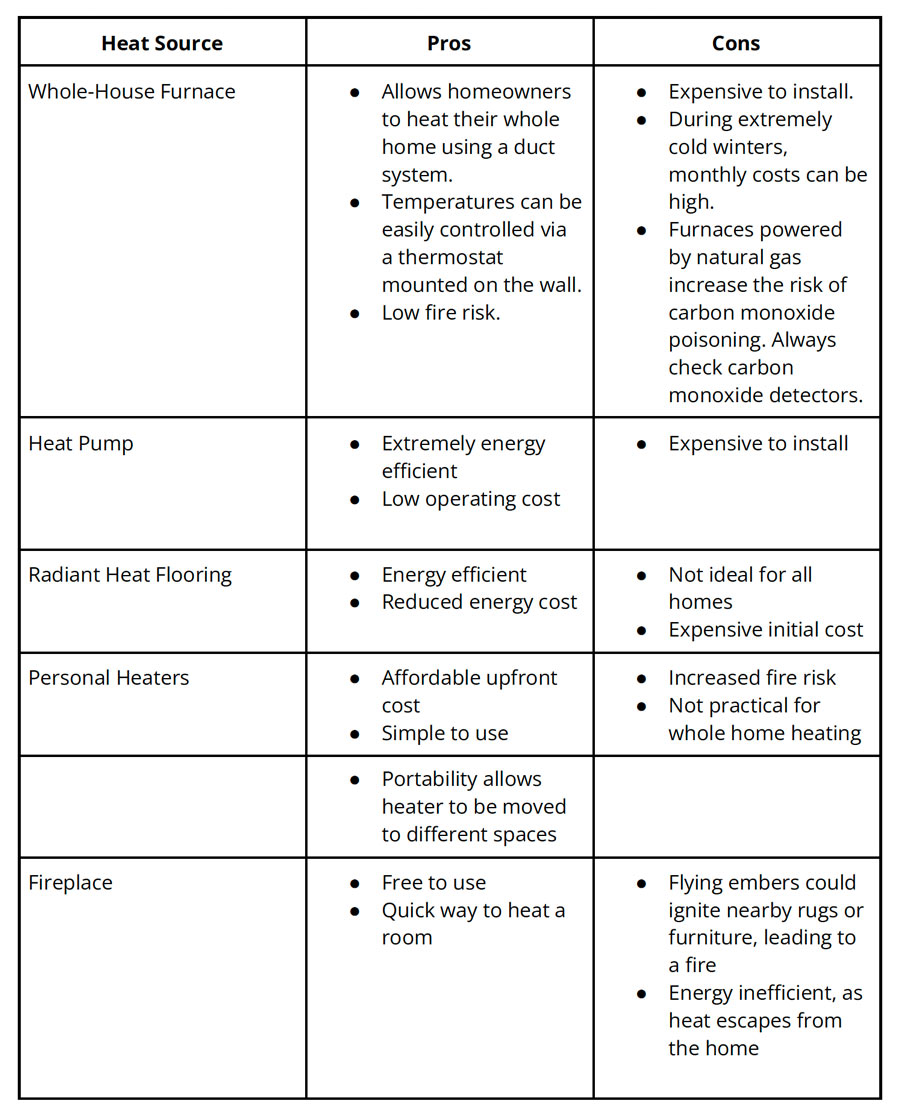Stay Warm Safely: The Rising Risk of Portable Heater Fires During Winter
As temperatures plummet around the St. Louis metropolitan region, homeowners turn up the heat on furnaces to warm homes. In some older homes or homes not properly installed with HVAC access, staying warm during the winter leads to using portable heaters.
As these heaters represent an elevated fire risk, individuals must use these heaters appropriately and follow safety guidelines that minimize the risk of portable heater fires. Unfortunately, the National Fire Protection Association (NFPA) reports that space heaters (or portable heaters) represented “…one-third of the fires, but nearly nine out of ten deaths and four out of five of the injuries in home fires caused by heating equipment.”

Table of Contents:
What Causes the Most House Fires? How Do Space Heaters Start Fires? Types of Space Heaters
- Portable Propane Heater
- Portable Electric Heater
- Portable Solar Space Heater
- Infrared Space Heater
- Ceramic Element Space Heater
- Using a Space Heater Extension Cord
- Risks Beyond Fires: Space Heater Skin Damage Hot Truths About Personal Heaters
- FAQ: Space Heaters
Key Takeaways:
Portable heaters lead to one-third of all home heating equipment fires. Homeowners must be diligent when using these small heaters to minimize the risk of fire and injury.
What Causes the Most House Fires?
According to the NFPA, 49 percent of house fires originate from cooking. However, heating equipment is the second leading cause of house fires, accounting for 13 percent of residential fires.
Electrical equipment/lighting and intentional (arson) account for 9 percent of house fires. Smoking materials cause only 5 percent of total residential fires.
How Do Space Heaters Start Fires?
Space heaters pose numerous fire hazards. Some space heaters use propane as a heating source; flammable objects near the heating element catch fire and spread quickly. Propane also is highly flammable.
When portable electric heaters are plugged into a power strip or an extension cord, an electrical surge might lead to a fire. These small heaters are not designed for use with these outlet types; instead, electric space heaters must be plugged into a wall outlet.
However, other issues related to portable heaters also increase the risk of a house fire. For example, placing the heater on an uneven surface could lead to the heater falling and igniting a fire. Leaving the heater running all night might cause a fire because of an overloaded circuit, or a nearby item could ignite. Some older portable heaters might not be designed with the same safety features as a more modern heater.
Types of Space Heaters
Homeowners who need to boost the warmth of their home temporarily discover that there are many different types of portable heaters. Some are electric, while others rely on other heat sources. Homeowners must understand the hazards of different portable
heaters–some should NOT be used in the home.
Portable Propane Heater
A portable propane heater generates heat from burning propane. These portable heaters are ideal for providing warmth in an outdoor setting. However, propane heaters should not be used indoors because of the risk of both fires and carbon monoxide poisoning.
Theme parks and other outdoor venues use these heaters to comfort guests during winter or for events held at night during autumn. When using these heaters, never leave them unattended, and keep any flammable objects or materials away from the heater.
Portable Electric Heater
Portable electric heaters utilize electricity to power the heating element and warm a space. These heaters are safe to use indoors. However, they should be plugged directly into an outlet. Never plug an electric heater into a power strip, as this can overwhelm the heater and ignite a fire.
Portable electric heaters come in all sizes. Some use a fan to heat a space, while others use a ceramic element. Always unplug an electric heater when leaving the home or going to bed. These heaters also need to be placed on a flat surface. Keep all flammable objects and materials away from the heater, and always be mindful of children and pets.
Portable Solar Space Heater
Solar space heaters require the energy of the sun for power. Homeowners can find these heaters for purchase online, but a solar heater is much more expensive than a standard electric heater. Expect to spend around $400 for a solar space heater; homeowners must also abide by the standard fire safety tips when using this portable heater. Don’t assume that the power of the sun makes it safer.
Infrared Space Heater
Infrared space heaters burn extremely hot, making them a burn hazard for children and pets. They also are not the most practical way to heat a space; while they generate extreme heat, they do not project this heat effectively.
Ceramic Element Space Heater
Ceramic element heaters use electricity to generate their heat. These heaters are more energy-efficient and a good choice for adding warmth to an indoor space. Again, homeowners must place these heaters on an even surface and keep them away from flammable materials.
Using a Space Heater Extension Cord
Electric space heaters are designed to use a standard power outlet. Individuals might be tempted to plug these heaters into a powerstrip or use a long extension cord to position the heater in a specific area.
Space heaters are not designed to be used with a power strip or an extension cord. This misuse can increase the risk of a fire. In addition, ‘daisy chaining’—connecting one power strip to another—poses a substantial fire risk.
Risks Beyond Fire: Space Heater Skin Damage
While space heaters are the second leading cause of residential fires, they also elevate the risk of injury. Infrared space heaters emit extreme heat via the element; these portable heaters could lead to severe burns for children or animals.
However, burn risk is not isolated to just infrared heaters. The heating element of any space heater can lead to burns and injuries.
Erythema Ab Igne–colloquially known as Toasted Skin Syndrome–refers to a skin condition caused by repeated exposure to heat. The heat source could be a personal heater, hot water, bottle, heating pad, etc. The rash looks like webbing, and it might itch or burn.
Hot Tips for Using Personal Heaters
Mehlville Fire Protection District urges all residents to use any portable heating device safely. Follow these five safety tips to help reduce the risk of a residential fire:
- Only plug personal heaters into a wall outlet. NEVER use an extension cord.
- Turn off the heater when leaving the house or when going to bed.
- Only use a personal heater on a flat surface.
- Check the function of all smoke and carbon monoxide detectors before using personal heaters.
- Keep all flammable materials and objects away from the heater.
Safe Ways to Heat the Home
The safest way to keep a home warm during winter is to use central heating via a furnace, a heat pump system, or even radiant heat flooring. Learn more about the pros and cons of
different heat sources via this simple graph:

FAQs: About Personal Heaters
Do portable heaters use a lot of electricity?
Some personal heaters are energy efficient. However, these heaters are not eligible to receive an ENERGY STAR certification. In general, though, a small personal heater used for a brief period should not add much to the monthly electricity bill.
What type of portable heater is best?
The best type of portable heaters use electricity to source their heat. Just remember to plug these heaters into a wall outlet only. NEVER use a power strip or an extension cord.
Are space heaters more cost-effective?
Space heaters are not more cost-effective. The fire risk they pose makes them a poor choice for home heating.
Are portable heaters safe?
Portable heaters and other heating sources are the second leading cause of residential fires. When used properly, a personal heater can help provide additional warmth to a space. However, these heaters should not be used as a long-term heating solution, and personal heaters must be unplugged or turned off before leaving the home or going to bed.
What heaters are safe to leave on overnight?
Only central heating via a furnace is safe for overnight use. Personal heaters, fireplaces, and other heating sources should NOT be used overnight.

